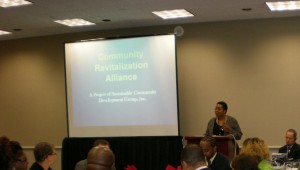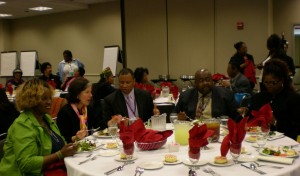New Orleans & Gulf Coast Area Health Disparities Initiative
SCDG managed and delivered the post-hurricane Katrina effort of an inclusive nationwide coalition on health, rebuilding, land use and community restoration, racial justice and environmental quality. Delivery included the national 50-member multi-stakeholder planning committee; communications, scheduling, logistics and contracts; agendas, materials, speakers; teleconference and meeting facilitation; convening and facilitating the regional conference.
Capitol Hill Summit on Sustainable Communities, Environmental Justice & the New Economy
 US EPA, ATSDR, CDC’s National Center for Environmental Health, Kellogg and Ford Foundations and SCDG partnership. Leaders including US EPA Administrator, Lisa P. Jackson, Rep. John Conyers, Jr., former Congressional Black Caucus Chair, Rep. Emmanuel Cleaver, Georges Benjamin of the American Public Health Association, former Governor Parris Glendening and four US EPA Assistant Administrators addressed the attendees.
US EPA, ATSDR, CDC’s National Center for Environmental Health, Kellogg and Ford Foundations and SCDG partnership. Leaders including US EPA Administrator, Lisa P. Jackson, Rep. John Conyers, Jr., former Congressional Black Caucus Chair, Rep. Emmanuel Cleaver, Georges Benjamin of the American Public Health Association, former Governor Parris Glendening and four US EPA Assistant Administrators addressed the attendees.
North Carolina Green Economy Technical Assistance Forum for Mayors & Tribal Leaders
SCDG collaborated with co-hosts US EPA, the North Carolina Community Development Initiative, State agencies and leading universities and organizations in the State to plan and produce the North Carolina Sustainable Economic Development Technical Assistance Forum for Mayors and Tribal Leaders. The Forum established a partnership with the objective of bringing additional sustainable economic development technical assistance, green economy resources and the means to create jobs to municipalities in the State especially communities that are challenged with poverty, high unemployment, health disparities and environmentally contaminated or under-utilized properties.
Alabama Workshops on the Finance & Science of Sustainability
 SCDG planned and delivered two workshops in eastern and western Alabama on environmental cleanup as a catalyst for sustainable development. The workshops were convened in collaboration with the Alabama League of Municipalities, the University of West Alabama, Tuskegee University, Auburn University, the Department of Environmental Management and the Department of Tax and Revenue. This advanced learning opportunity engaged municipal officials throughout the State in peer learning and provided expert advice on financing and funding opportunities relevant to cleanup of contaminated brownfields and vacant properties; green infrastructure; healthy homes and buildings; energy efficiency; transit options; job creation and green jobs.
SCDG planned and delivered two workshops in eastern and western Alabama on environmental cleanup as a catalyst for sustainable development. The workshops were convened in collaboration with the Alabama League of Municipalities, the University of West Alabama, Tuskegee University, Auburn University, the Department of Environmental Management and the Department of Tax and Revenue. This advanced learning opportunity engaged municipal officials throughout the State in peer learning and provided expert advice on financing and funding opportunities relevant to cleanup of contaminated brownfields and vacant properties; green infrastructure; healthy homes and buildings; energy efficiency; transit options; job creation and green jobs.
Mississippi Municipal League Small Communities Conference Workshops
Two workshops for rural and small communities were designed, planned and delivered by SCDG at consecutive annual Small Communities Conferences in Philadelphia, MS and Vicksburg, MS. The workshops, entitled “Using Sustainability As A Tool For Economic Development,” educated mayors and other municipal officials and staff about federal and state governmental programs; creatively using a mix of development and environmental programs to meet site redevelopment needs; attracting private financing for the sustainable brownfields and land reuse process; blending traditional funding sources, tax incentives and green funding to make a project work; and focusing on strategies and best practices.
Additional Resources:
Capitol Hill Summit Agenda-At-A-Glance
Capitol Hill Summit Concept Paper
| S | M | T | W | T | F | S |
|---|---|---|---|---|---|---|
| « Jul | ||||||
| 1 | 2 | 3 | 4 | 5 | ||
| 6 | 7 | 8 | 9 | 10 | 11 | 12 |
| 13 | 14 | 15 | 16 | 17 | 18 | 19 |
| 20 | 21 | 22 | 23 | 24 | 25 | 26 |
| 27 | 28 | 29 | 30 | 31 | ||
NEW YORK—Today, the National Audubon Society announced the appointment of Deeohn Ferris, J.D., as vice president for equity, diversity and inclusion at the venerable conservation organization. Ferris is a pioneer in the environmental justice field, with extensive experience in law and policy. She has worked on community regeneration with federal agencies, governments, foundations, communities of color, low income, and tribal and indigenous organizations in the United States and countries on five continents.
“My definition of equity is community building and inclusive community engagement in planning, decisions and investments that broaden pathways and access to environmental benefits and opportunities,” said Ferris. “I am thrilled to contribute to the work that Audubon is doing to build a more equitable and inclusive conservation movement and to make strides together to strengthen and build on this progress. Every community is entitled to a healthy environment, to the beneficial effects of birds and nature, and the ability to impact decisions about their lives and places.”
“Equity, diversity and inclusion are core values and strategic imperatives for Audubon, and Deeohn Ferris brings a truly formidable set of skills, accomplishments, and relationships,” said Audubon President and CEO David Yarnold. “What we do is what matters, and Deeohn’s decades of work at the intersection of equality and environmental issues makes her a natural fit to lead Audubon’s efforts. She is a doer with a remarkable track record of success in broadening equity and inclusion.”
Ferris comes to Audubon from her position as president and founder of Sustainable Community Development Group, a not-for-profit national research and public-policy social venture enterprise. She has been a thought leader for equity and inclusion throughout her career, fostering collaboration among diverse stakeholders and across interdisciplinary sectors. Ferris began her career at the U.S. Environmental Protection Agency. She served as counsel to the American Insurance Association and was the first African-American senior policy office director at the National Wildlife Federation. After that, she launched the Environmental Justice Project for the Lawyers’ Committee for Civil Rights Under Law.
Ferris is recognized for her success in building complex coalitions with a wide variety of community, governmental, nonprofit, philanthropic and private sector leaders. She has over 20 years of expertise in groundbreaking environmental advocacy, rooted in her leadership of the landmark national campaign that resulted in the federal Presidential Environmental Justice Executive Order 12898. Ferris capitalized on this momentum by establishing the Washington Office on Environmental Justice representing hundreds of communities and faith leaders in the United Nations, Congress and other legislative bodies.
Ferris will lead equity, diversity and inclusion initiatives across Audubon’s 700-person staff, board of directors, 1.1 million members, 463 local chapters and more than 60 local and regional advisory boards.
Audubon’s statement on equity, diversity, and inclusion reads in part:
“Just as biodiversity strengthens natural systems, the diversity of human experience strengthens our conservation efforts for the benefit of nature and all human beings. Audubon must represent and reflect that human diversity, embracing it in all the communities where we work, in order to achieve our conservation goals. To that end, we are committed to increasing the diversity of our staff, board, volunteers, members and supporters, and to fostering an inclusive network of Audubon centers and chapters in all kinds of communities, from rural to urban.”
Ferris will join Audubon August 1, 2017, and will be based in Washington, D.C., reporting to Chief Network Officer David J. Ringer.
The National Audubon Society protects birds and the places they need, today and tomorrow, throughout the Americas using science, advocacy, education and on-the-ground conservation. Audubon’s state programs, nature centers, chapters and partners have an unparalleled wingspan that reaches millions of people each year to inform, inspire and unite diverse communities in conservation action. Since 1905, Audubon’s vision has been a world in which people and wildlife thrive. Audubon is a nonprofit conservation organization. Learn more and how to help at www.audubon.org and follow us on Twitter and Instagram at @audubonsociety.
###
Contact: Nicolas Gonzalez, ngonzalez@audubon.org, 212-979-3068.
